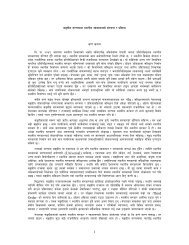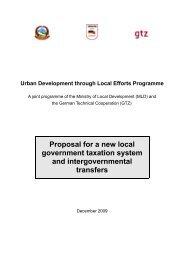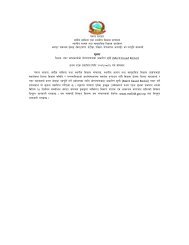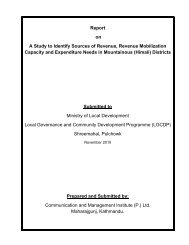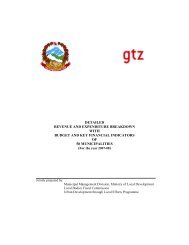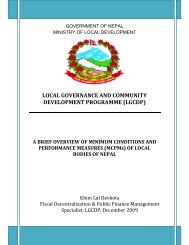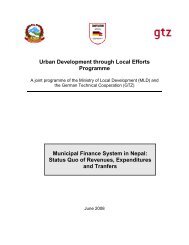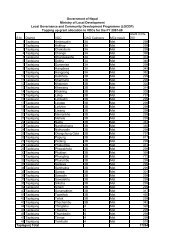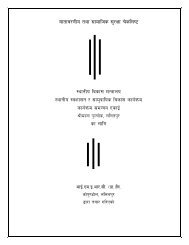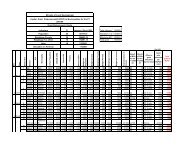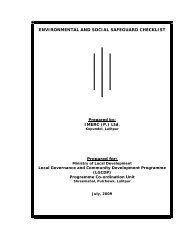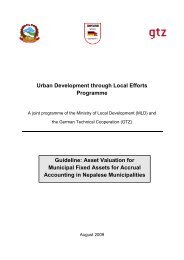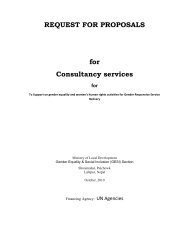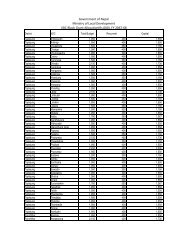GTZ Report on Accrual Accounting Status Quo - LGCDP
GTZ Report on Accrual Accounting Status Quo - LGCDP
GTZ Report on Accrual Accounting Status Quo - LGCDP
You also want an ePaper? Increase the reach of your titles
YUMPU automatically turns print PDFs into web optimized ePapers that Google loves.
Findings and observati<strong>on</strong>s in the Nepalese municipalities 19<br />
KMC. KMC is also in the process of decentralizing this software to its wards, making it easier for<br />
citizens to access public services. The wards functi<strong>on</strong> as local accounting centres and <strong>on</strong>ly have<br />
a limited budget. Through the network c<strong>on</strong>necti<strong>on</strong> the wards and the central KMC administrati<strong>on</strong><br />
will be interlinked, making it easy for the central management to supervise the activities in the<br />
wards. The software is also able to limit access to different accounting heads and vouchers<br />
according to the job positi<strong>on</strong> of the public officer. The creati<strong>on</strong> of cost centres according to<br />
projects, taxes, fees, wards, specific individuals and so <strong>on</strong> is also possible. All in all this<br />
integrated and modular software is easy adjustable to the needs and administrative status of any<br />
municipality and would be a sound soluti<strong>on</strong> for all municipalities in Nepal.<br />
• KMC is well ahead of modified accrual accounting but is not practising asset management,<br />
meaning depreciati<strong>on</strong>s, and reserve allocati<strong>on</strong> etc. at the moment.<br />
Type II • These municipalities have some experiences in accrual accounting implementati<strong>on</strong> but failed in<br />
the previous attempt for explained reas<strong>on</strong>s (Dhangadhi, Nepalgunj, Pokhara, Hetauda and<br />
Banepa).<br />
• Some of these municipalities also tried to implement accrual accounting manually but<br />
disc<strong>on</strong>tinued after some time and returned to cash based accounting.<br />
• These municipalities all have at least partly computerized accounting and/or tax systems and<br />
usually are eager to restart there accrual accounting implementati<strong>on</strong>s efforts.<br />
Type III • These municipalities did not try to implement accrual accounting systems but have at least partly<br />
computerized accounting systems and some informati<strong>on</strong> about what accrual accounting is (e.g.<br />
Lalitpur, Bhaktapur).<br />
• Some of these municipalities now feel prepared to join the accrual accounting reform process.<br />
Type IV • These municipalities are not computerized, have never tried to implement accrual accounting and<br />
also do not have sufficient informati<strong>on</strong> about what accrual accounting actually is (many small<br />
and remote municipalities etc.).<br />
All in all the municipalities of Nepal are currently under a str<strong>on</strong>g pressure for reform. They are still very much<br />
dependent <strong>on</strong> the Local Development Fee (LDF), which is a nati<strong>on</strong>al import tax, collected by the central government<br />
and distributed to the municipalities. The LDF accounts for over 70 percent of the municipal tax revenues (udle, 2008).<br />
However due to the upcoming membership of Nepal in the WTO the LDF will be abolished so<strong>on</strong>. This will leave the<br />
municipalities with a huge revenue gap. The government has not yet decided how much m<strong>on</strong>ey <strong>on</strong> which scheme will<br />
be distributed to the municipalities in order to partly cover this gap in the future.<br />
Whatsoever, the municipalities are very much under pressure to increase their own revenues through local taxes and<br />
fees but also to find ways to efficiently allocate scare resources. The implementati<strong>on</strong> of accrual accounting can be<br />
of major help in achieving these aims (see again advantages <strong>on</strong> p.5).



